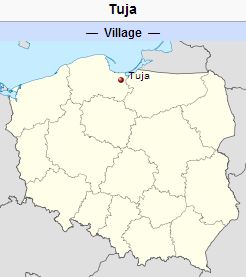Difference between revisions of "Tiege (Pomeranian Voivodeship, Poland)"
| [unchecked revision] | [checked revision] |
GameoAdmin (talk | contribs) (CSV import - 20130820) |
GameoAdmin (talk | contribs) (CSV import - 20130823) |
||
| Line 1: | Line 1: | ||
| − | [[File:Tuja.jpg|300px|thumb|right|''Tiege (now Tuja, Poland) | + | [[File:Tuja.jpg|300px|thumb|right|''Tiege (now Tuja, Poland) |
| − | Source: [http://en.wikipedia.org/wiki/Tuja Wikipedia Commons] | + | Source: [http://en.wikipedia.org/wiki/Tuja Wikipedia Commons]'']] Tiege (also known as Thuya and Tuga; now known as Tuja; coordinates: 54.179, 19.0614 [54° 10′ 44″ N, 19° 3′ 41″ E]; population in 1905, 494; in 2012, 190) is located approximately 6 kilometres (4 miles) south-west of Nowy Dwór Gdański ([[Tiegenhof (Pomeranian Voivodeship, Poland)|Tiegenhof]]), 16 km. (10 mi.) north of Malbork ([[Marienburg (Pomeranian Voivodeship, Poland)|Marienburg]]), 21 km. (13 mi.) west of Elbląg ([[Elbing (Warmian-Masurian Voivodeship, Poland)|Elbing]]), and 35 km. (22 mi.) south-east of the regional capital Gdańsk ([[Danzig (Poland)|Danzig]]). |
| − | |||
| − | '']] Tiege (also known as Thuya and Tuga; now known as Tuja; coordinates: 54.179, 19.0614 [54° 10′ 44″ N, 19° 3′ 41″ E]; population in 1905, 494; in 2012, 190) is located approximately 6 kilometres (4 miles) south-west of Nowy Dwór Gdański ([[Tiegenhof (Pomeranian Voivodeship, Poland)|Tiegenhof]]), 16 km. (10 mi.) north of Malbork ([[Marienburg (Pomeranian Voivodeship, Poland)|Marienburg]]), 21 km. (13 mi.) west of Elbląg ([[Elbing (Warmian-Masurian Voivodeship, Poland)|Elbing]]), and 35 km. (22 mi.) south-east of the regional capital Gdańsk ([[Danzig (Poland)|Danzig]]). | ||
Tiege was first mentioned in historical documents in 1318 (Thuya) and received privileges in 1345. Until 1772 Tiege was part of the Kingdom of [[Poland|Poland]]. The First Partition of Poland in 1772 resulted in the creation of a new province in 1773, called [[West Prussia|West Prussia]], in which Tiege was located. Tiege was situated in the district (Kreis) of Marienburg until the establishment of the [[Danzig, Free City of|Free City of Danzig]] in 1920. The village came under the control of Nazi Germany during World War II until February 1945, when it was occupied by Soviet forces and returned to Poland. Today Tiege is a village in the administrative district of Gmina Nowy Dwór Gdański, within Nowy Dwór Gdański County, Pomeranian Voivodeship. | Tiege was first mentioned in historical documents in 1318 (Thuya) and received privileges in 1345. Until 1772 Tiege was part of the Kingdom of [[Poland|Poland]]. The First Partition of Poland in 1772 resulted in the creation of a new province in 1773, called [[West Prussia|West Prussia]], in which Tiege was located. Tiege was situated in the district (Kreis) of Marienburg until the establishment of the [[Danzig, Free City of|Free City of Danzig]] in 1920. The village came under the control of Nazi Germany during World War II until February 1945, when it was occupied by Soviet forces and returned to Poland. Today Tiege is a village in the administrative district of Gmina Nowy Dwór Gdański, within Nowy Dwór Gdański County, Pomeranian Voivodeship. | ||
Revision as of 14:52, 23 August 2013

Tiege (also known as Thuya and Tuga; now known as Tuja; coordinates: 54.179, 19.0614 [54° 10′ 44″ N, 19° 3′ 41″ E]; population in 1905, 494; in 2012, 190) is located approximately 6 kilometres (4 miles) south-west of Nowy Dwór Gdański (Tiegenhof), 16 km. (10 mi.) north of Malbork (Marienburg), 21 km. (13 mi.) west of Elbląg (Elbing), and 35 km. (22 mi.) south-east of the regional capital Gdańsk (Danzig).
Tiege was first mentioned in historical documents in 1318 (Thuya) and received privileges in 1345. Until 1772 Tiege was part of the Kingdom of Poland. The First Partition of Poland in 1772 resulted in the creation of a new province in 1773, called West Prussia, in which Tiege was located. Tiege was situated in the district (Kreis) of Marienburg until the establishment of the Free City of Danzig in 1920. The village came under the control of Nazi Germany during World War II until February 1945, when it was occupied by Soviet forces and returned to Poland. Today Tiege is a village in the administrative district of Gmina Nowy Dwór Gdański, within Nowy Dwór Gdański County, Pomeranian Voivodeship.
In 1727, 28 Mennonites lived in the village; the 1776 Prussian census lists 16 Mennonite families living in Tiege with the following surnames: Borckmann, Claassen, Dack, Diderich, Epp, Friesen, Froes, Funck, Gerbrand, Penner, Reimer, Teows, and Wieb. In 1820, the combined villages of Tiege and Tiegefelde had 431 residents, including 86 Mennonites. In 1936, the village was inhabited by 18 families: Driedger, Ens, Hinz, Heidebrecht, Jansson, Janzen, Klaassen, Mekelburger, Neufeld, Penner, Quiring, Ran, van Riesen, Thiesen, Wiebe, and Wiens, among others.
The Flemish Mennonites of Tiege were members of the Ladekopp Mennonite Church while the Frisian Mennonites were members of the Orlofferfelde Mennonite Church.
Bibliography
Stowarzyszenie Konserwatorów Zabytków. "Tuja." Catalogue of Monuments of Dutch Colonization in Poland. 2005. Web. 25 November 2012. http://holland.org.pl/art.php?kat=obiekt&id=465&lang=en.
Wikipedia. "Tuja." Web. 25 November 2012. http://en.wikipedia.org/wiki/Tuja.
Wolf, Hans-Jürgen. "Familienforschung in Westpreußen." Web. 25 November 2012. http://www.westpreussen.de/cms/ct/ortsverzeichnis/details.php?ID=6509.
Maps
Map:Tuja, Pomeranian Voivodeship, Poland
| Author(s) | Richard D Thiessen |
|---|---|
| Date Published | November 2012 |
Cite This Article
MLA style
Thiessen, Richard D. "Tiege (Pomeranian Voivodeship, Poland)." Global Anabaptist Mennonite Encyclopedia Online. November 2012. Web. 19 Jan 2026. https://gameo.org/index.php?title=Tiege_(Pomeranian_Voivodeship,_Poland)&oldid=96712.
APA style
Thiessen, Richard D. (November 2012). Tiege (Pomeranian Voivodeship, Poland). Global Anabaptist Mennonite Encyclopedia Online. Retrieved 19 January 2026, from https://gameo.org/index.php?title=Tiege_(Pomeranian_Voivodeship,_Poland)&oldid=96712.
©1996-2026 by the Global Anabaptist Mennonite Encyclopedia Online. All rights reserved.